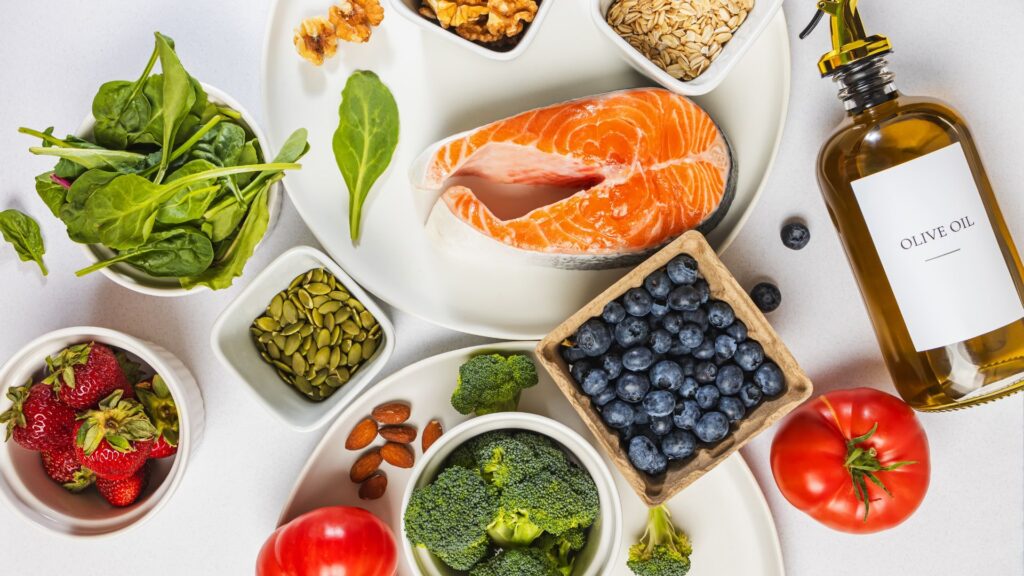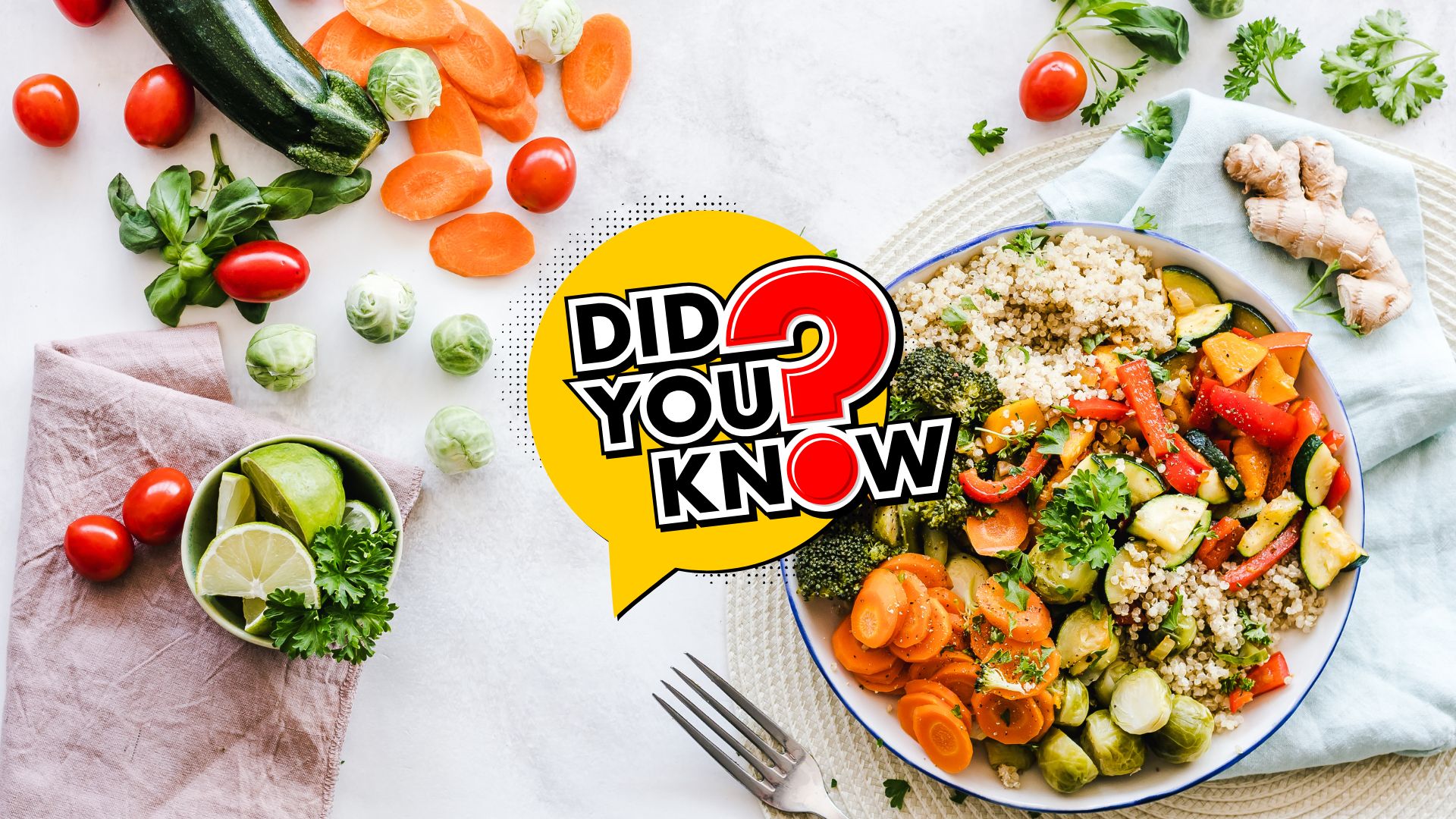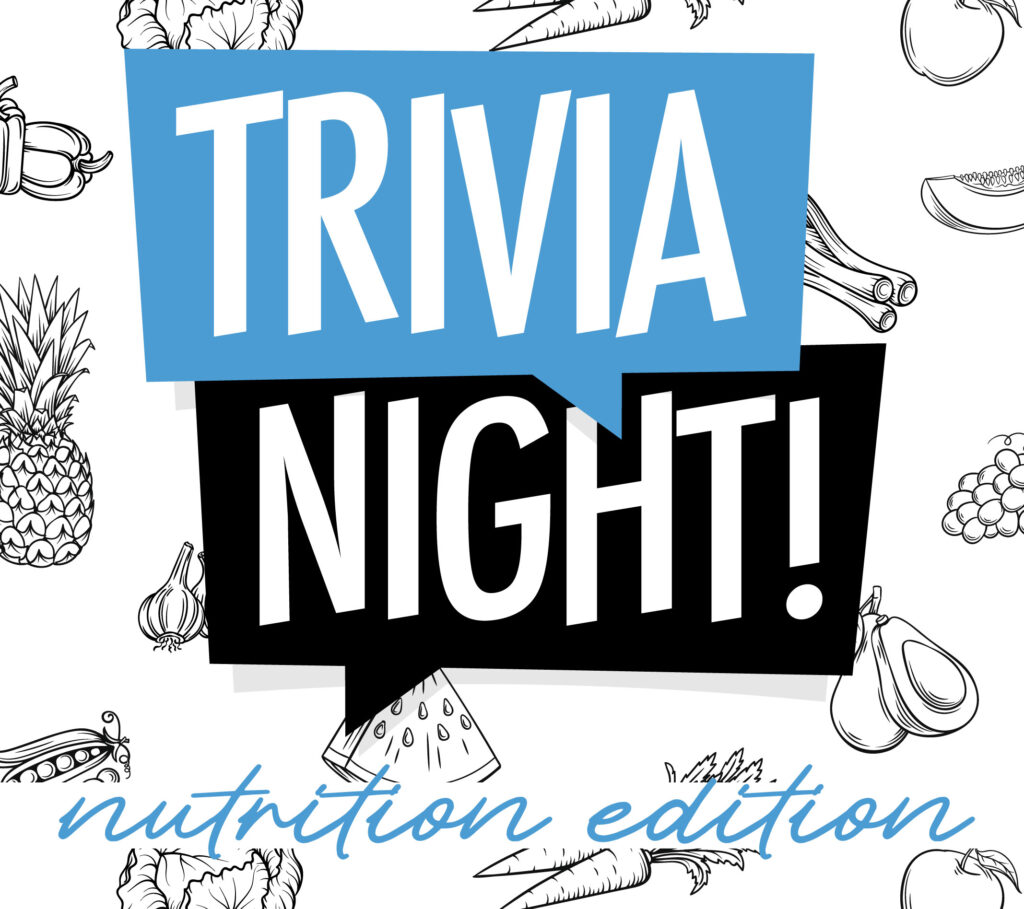Eating healthy foods is essential for maintaining good health, but it’s not always easy to know what’s best for your body.
Many people find nutrition information confusing and hard to remember. This article will help you learn important nutrition facts in a fun, engaging way.
We’ve compiled a list of over 151+ nutrition trivia questions covering various topics, from vitamins and minerals to healthy eating habits.
By the end of this article, you’ll better understand how to make informed choices about what you eat and how to maintain a balanced diet.
Get ready to test your knowledge and learn some surprising facts about the food you put on your plate daily!
131+ Must -Know Nutrition Trivia Questions & Answers

-
What vitamin is known to help maintain healthy eyesight?
A: Vitamin A -
Which mineral is crucial for strong bones and teeth?
A: Calcium -
What is the main difference between saturated and unsaturated fats?
A: Saturated fats are solid at room temperature, while unsaturated fats are liquid. -
Which vitamin is essential for the absorption of calcium in the body?
A: Vitamin D -
What is the recommended daily intake of fiber for adults?
A: 25-30 grams per day -
Which nutrient is the body’s primary source of energy?
A: Carbohydrates -
What is the term for a diet that excludes all animal products?
A: Vegan diet -
Which vitamin is known for its role in supporting a healthy immune system?
A: Vitamin C -
What is the primary function of protein in the body?
A: Building and repairing tissues -
Which mineral is essential for proper thyroid function?
A: Iodine -
What is the recommended daily limit for added sugars in the diet?
A: Less than 10% of total daily calories -
Which type of fat is considered the healthiest?
A: Monounsaturated fat -
What is the primary role of vitamin K in the body?
A: Assisting in blood clotting -
Which B vitamin is essential for the production of red blood cells?
A: Vitamin B12 -
What is the term for a diet that includes fish but no other meat?
A: Pescatarian diet -
Which mineral is important for maintaining proper fluid balance in the body?
A: Potassium -
What is the recommended daily intake of sodium for adults?
A: Less than 2,300 milligrams per day -
Which vitamin is known for its role in maintaining healthy skin and hair?
A: Biotin (Vitamin B7) -
What is the primary function of dietary fiber in the body?
A: Promoting regular bowel movements and digestive health -
Which type of fat is considered the least healthy?
A: Trans fat -
What is the term for a diet that includes eggs and dairy but no meat?
A: Ovo-lacto vegetarian diet -
Which mineral is essential for proper muscle and nerve function?
A: Magnesium -
What is the recommended daily intake of vitamin C for adults?
A: 65-90 milligrams per day -
Which nutrient is the body’s primary source of stored energy?
A: Fat -
What is the term for a diet that includes plant-based foods and occasional meat consumption?
A: Flexitarian diet -
Which B vitamin is essential for metabolizing carbohydrates, fats, and proteins?
A: Vitamin B1 (Thiamine) -
What is the primary role of antioxidants in the body?
A: Protecting cells from damage caused by free radicals -
Which mineral is important for the formation of hemoglobin in red blood cells?
A: Iron -
What is the recommended daily intake of calcium for adults?
A: 1,000-1,200 milligrams per day -
Which vitamin is known for its role in maintaining healthy blood clotting?
A: Vitamin K -
What is the term for a diet that excludes gluten, a protein found in wheat, barley, and rye?
A: Gluten-free diet -
Which mineral is essential for proper blood sugar regulation?
A: Chromium -
What is the recommended daily intake of vitamin D for adults?
A: 15-20 micrograms (600-800 IU) per day -
Which nutrient is the body’s primary source of quick energy?
A: Simple carbohydrates (sugars) -
What is the term for a diet that emphasizes whole, minimally processed foods?
A: Whole foods diet -
Which B vitamin is essential for the maintenance of healthy nerve cells?
A: Vitamin B12 -
What is the primary role of omega-3 fatty acids in the body?
A: Supporting heart and brain health -
Which mineral is important for the regulation of blood pressure?
A: Potassium -
What is the recommended daily intake of protein for adults?
A: 0.8 grams per kilogram of body weight -
Which vitamin is known for its role in maintaining healthy bones and teeth?
A: Vitamin D -
What is the term for a diet that excludes all foods containing or processed with animal products?
A: Vegan diet -
Which mineral is essential for proper immune system function?
A: Zinc -
What is the recommended daily intake of vitamin E for adults?
A: 15 milligrams per day -
Which nutrient is the body’s primary source of slow-release energy?
A: Complex carbohydrates (starches) -
What is the term for a diet that emphasizes plant-based foods but allows occasional meat consumption?
A: Plant-based diet -
Which B vitamin is essential for the metabolism of amino acids?
A: Vitamin B6 (Pyridoxine) -
What is the primary role of probiotics in the body?
A: Supporting digestive health and immune function -
Which mineral is important for the maintenance of healthy skin and hair?
A: Selenium -
What is the recommended daily intake of vitamin A for adults?
A: 700-900 micrograms per day -
Which vitamin is known for its role in maintaining healthy gums?
A: Vitamin C -
What is the term for a diet excluding all animal products except honey?
A: Beegan diet -
Which mineral is essential for proper wound healing?
A: Zinc -
What is the recommended daily intake of vitamin K for adults?
A: 90-120 micrograms per day -
Which nutrient is the body’s primary source of structural support?
A: Protein -
What is the term for a diet that emphasizes raw, uncooked foods?
A: Raw food diet -
Which B vitamin is essential for the production of energy from carbohydrates?
A: Vitamin B2 (Riboflavin) -
What is the primary role of phytochemicals in the body?
A: Providing antioxidant and anti-inflammatory benefits -
Which mineral is important for the proper functioning of enzymes in the body?
A: Manganese -
What is the recommended daily folate intake (vitamin B9) for adults?
A: 400 micrograms per day -
Which vitamin is known for maintaining healthy vision in low-light conditions?
A: Vitamin A -
What is the term for a diet that excludes all grains?
A: Grain-free diet -
Which mineral is essential for proper bone mineralization?
A: Phosphorus -
What is the recommended daily intake of vitamin B12 for adults?
A: 2.4 micrograms per day -
Which nutrient is the body’s primary source of insulation and protection for organs?
A: Fat -
What is the term for a diet that emphasizes consuming whole, unprocessed foods?
A: Clean eating diet -
Which B vitamin is essential for the synthesis of DNA and RNA?
A: Folate (Vitamin B9) -
What is the primary role of flavonoids in the body?
A: Providing antioxidant and anti-inflammatory benefits -
Which mineral is important for the proper functioning of the reproductive system?
A: Zinc -
What is the recommended daily intake of vitamin B6 for adults?
A: 1.3-1.7 milligrams per day -
Which vitamin is known for its role in maintaining healthy blood vessels?
A: Vitamin K -
What is the term for a diet that emphasizes consuming foods in their natural, unprocessed state?
A: Whole30 diet -
Which mineral is essential for proper muscle contraction?
A: Calcium -
What is the recommended daily intake of vitamin B2 (riboflavin) for adults?
A: 1.1-1.3 milligrams per day -
Which nutrient is the body’s primary source of long-term energy storage?
A: Fat -
What is the term for a diet that excludes all foods containing lactose, a sugar found in milk and dairy products?
A: Lactose-free diet
-
Which B vitamin is essential for the metabolism of fats and proteins?
A: Vitamin B3 (Niacin) -
What is the primary role of carotenoids in the body?
A: Acting as antioxidants and precursors to vitamin A -
Which mineral is important for the proper functioning of the nervous system?
A: Magnesium -
What is the recommended daily vitamin B1 (thiamine) intake for adults?
A: 1.1-1.2 milligrams per day -
Which vitamin is known for maintaining healthy skin and mucous membranes?
A: Vitamin A -
What is the term for a diet that excludes all foods containing soy?
A: Soy-free diet -
Which mineral is essential for proper insulin secretion and function?
A: Chromium -
What is the recommended daily intake of vitamin B3 (niacin) for adults?
A: 14-16 milligrams per day -
Which nutrient is the body’s primary source of essential amino acids?
A: Protein -
What is the term for a diet that emphasizes consuming foods low in carbohydrates?
A: Low-carb diet -
Which B vitamin is essential for the production of neurotransmitters in the brain?
A: Vitamin B6 (Pyridoxine) -
What is the primary role of polyphenols in the body?
A: Providing antioxidant and anti-inflammatory benefits -
Which mineral is important for the proper functioning of the cardiovascular system?
A: Potassium -
What is the recommended daily intake of pantothenic acid (vitamin B5) for adults?
A: 5 milligrams per day -
Which vitamin is known for its role in maintaining healthy red blood cells?
A: Vitamin B12 -
What is the term for a diet that excludes all foods containing nuts?
A: Nut-free diet -
Which mineral is essential for proper carbohydrate and fat metabolism?
A: Manganese -
What is the recommended daily intake of biotin (vitamin B7) for adults?
A: 30 micrograms per day -
Which nutrient is the body’s primary source of glucose for brain function?
A: Carbohydrates -
What is the term for a diet that emphasizes consuming foods high in healthy fats?
A: High-fat diet -
Which B vitamin is essential for maintaining healthy skin, hair, and nails?
A: Biotin (Vitamin B7) -
What is the primary role of glucosinolates in the body?
A: Providing anti-cancer and detoxification benefits -
Which mineral is important for the proper functioning of the immune system?
A: Selenium -
What is the recommended daily intake of vitamin B6 (pyridoxine) for adults?
A: 1.3-1.7 milligrams per day -
Which vitamin is known for its role in maintaining healthy nerve function?
A: Vitamin B12 -
What is the term for a diet that excludes all foods containing fish and shellfish?
A: Fish-free diet -
Which mineral is essential for proper protein synthesis?
A: Iron -
What is the recommended daily folate intake (vitamin B9) for pregnant women?
A: 600 micrograms per day -
Which nutrient is the body’s primary source of essential fatty acids?
A: Fat -
What is the term for a diet that emphasizes the consumption of foods low in fat?
A: Low-fat diet -
Which B vitamin is essential for producing serotonin, a neurotransmitter involved in mood regulation?
A: Vitamin B6 (Pyridoxine) -
What is the primary role of lignans in the body?
A: Providing antioxidant and phytoestrogenic benefits -
Which mineral is important for the proper functioning of the male reproductive system?
A: Zinc -
What is the recommended daily intake of vitamin B12 for vegetarians and vegans?
A: 2.4 micrograms per day (from fortified foods or supplements) -
Which vitamin is known for its role in maintaining healthy brain function?
A: Vitamin B12 -
What is the term for a diet that excludes all foods containing eggs?
A: Egg-free diet -
Which mineral is essential for proper blood sugar regulation and insulin sensitivity?
A: Chromium -
What is the recommended daily intake of calcium for postmenopausal women?
A: 1,200 milligrams per day -
Which nutrient is the body’s primary source of energy during prolonged exercise?
A: Fat -
What is the term for a diet that emphasizes consuming foods high in protein?
A: High-protein diet -
Which B vitamin is essential for producing melatonin, a hormone involved in sleep regulation?
A: Vitamin B6 (Pyridoxine) -
What is the primary role of sulforaphane in the body?
A: Providing anti-cancer and detoxification benefits -
Which mineral is important for the proper functioning of the thyroid gland?
A: Iodine -
What is the recommended daily vitamin D intake for older adults (>70 years)?
A: 20 micrograms (800 IU) per day -
Which vitamin is known for its role in maintaining healthy blood sugar levels?
A: Vitamin B1 (Thiamine) -
What is the term for a diet that excludes all foods containing peanuts?
A: Peanut-free diet -
Which mineral is essential for proper collagen synthesis?
A: Copper -
What is the recommended daily intake of vitamin E for adults?
A: 15 milligrams per day -
Which nutrient is the body’s primary source of ketones for brain function during fasting or carbohydrate restriction periods?
A: Fat -
What is the term for a diet that emphasizes consuming foods low in sodium?
A: Low-sodium diet -
Which B vitamin is essential for producing acetylcholine, a neurotransmitter involved in memory and learning?
A: Vitamin B5 (Pantothenic acid) -
What is the primary role of anthocyanins in the body?
A: Providing antioxidant and anti-inflammatory benefits -
Which mineral is important for the proper functioning of the muscular system?
A: Magnesium -
What is the recommended daily intake of vitamin C for smokers?
A: 35 milligrams more than the RDA for non-smokers -
Which vitamin is known for maintaining healthy cell division and growth?
A: Folate (Vitamin B9) -
What is the term for a diet that excludes all foods containing tree nuts?
A: Tree nut-free diet -
Which mineral is essential for proper taste and smell function?
A: Zinc -
What is the recommended daily intake of vitamin A for pregnant women?
A: 770 micrograms per day -
Which nutrient is the body’s primary source of energy during high-intensity exercise?
A: Carbohydrates -
What is the term for a diet that emphasizes consuming foods low in purine content?
A: Low-purine diet -
Which B vitamin is essential for producing hemoglobin in red blood cells?
A: Vitamin B6 (Pyridoxine) -
What is the primary role of resveratrol in the body?
A: Providing antioxidant and anti-aging benefits -
Which mineral is important for the proper functioning of the skeletal system?
A: Calcium -
What is the recommended daily intake of vitamin D for infants (0-12 months)?
A: 10 micrograms (400 IU) per day -
Which vitamin is known for maintaining healthy cognitive function in older adults?
A: Vitamin B12 -
What is the term for a diet that excludes all foods containing yeast?
A: Yeast-free diet -
Which mineral is essential for proper connective tissue formation?
A: Manganese -
What is the recommended daily intake of vitamin K for infants (0-6 months)?
A: 2 micrograms per day -
Which nutrient is the body’s primary energy source for red blood cells?
A: Glucose (from carbohydrates) -
What is the term for a diet that emphasizes consuming foods low in FODMAPs (fermentable oligosaccharides, disaccharides, monosaccharides, and polyols)?
A: Low-FODMAP diet -
Which B vitamin is essential for the metabolism of homocysteine, an amino acid linked to heart disease risk?
A: Folate (Vitamin B9) -
What is the primary role of quercetin in the body?
A: Providing antioxidant and anti-inflammatory benefits -
Which mineral is important for properly functioning the immune system in the skin?
A: Zinc -
What is the recommended daily intake of choline for pregnant women?
A: 450 milligrams per day -
Which vitamin is known for maintaining healthy fertility in both men and women?
A: Folate (Vitamin B9) -
What is the term for a diet that excludes all foods containing artificial colors, flavors, and preservatives?
A: Clean-label diet -
Which mineral is essential for proper antioxidant function in the body?
A: Selenium
Conclusion
Nutrition trivia is not only fun but also an excellent way to learn about maintaining a healthy lifestyle.
By testing your knowledge of various aspects of nutrition, from vitamins and minerals to different diets and their effects on the body, you can make more informed choices about what you eat.
Remember, a balanced diet rich in essential nutrients is key to supporting overall health and well-being. With this newfound knowledge, you can now improve your eating habits and share these fascinating facts with friends and family.
Why not challenge them to a friendly game of nutrition trivia and see who comes out on top?
Start making positive changes in your diet today, and enjoy the benefits of a healthier, happier you!


